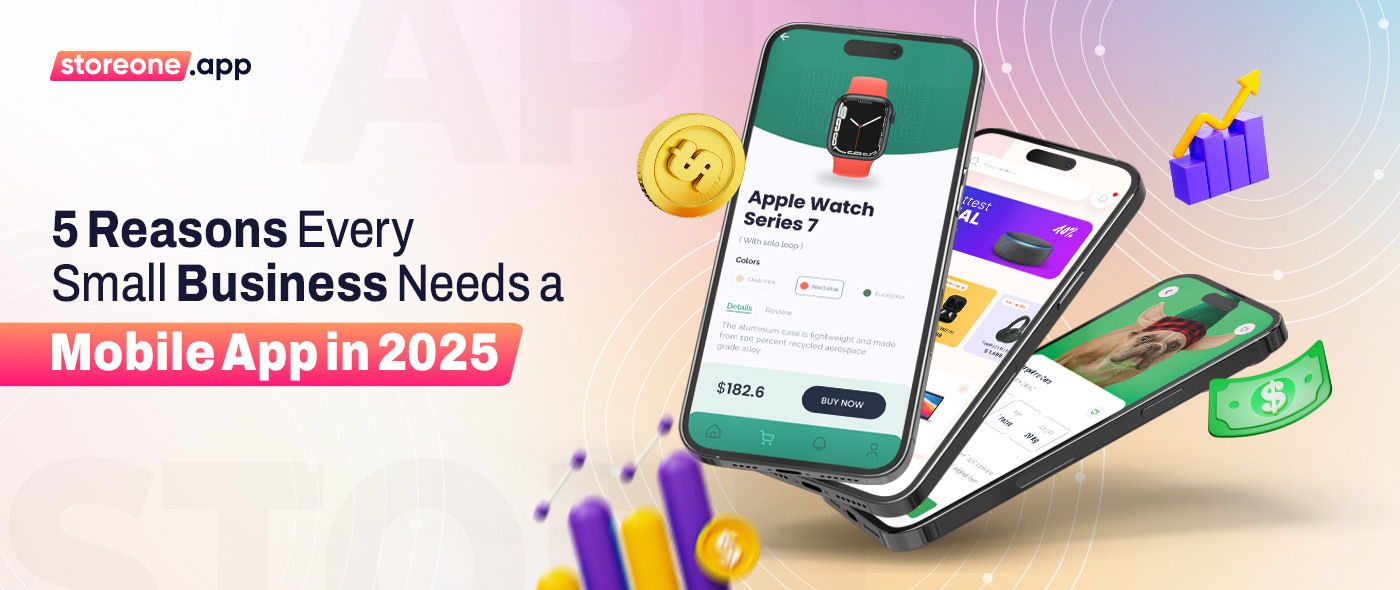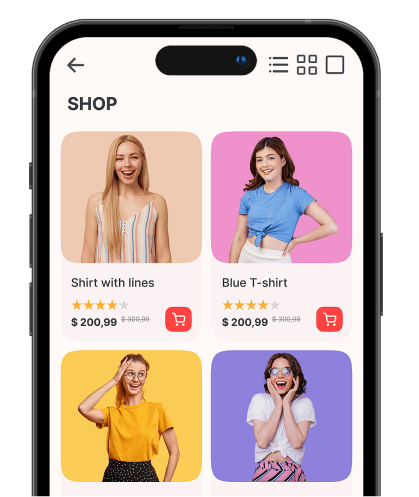5 Reasons Every Small Business Needs A Mobile App in 2025

As we enter 2025, the digital landscape for small businesses is rapidly changing, and mobile apps have become a crucial part of staying competitive. More than just a trend, a mobile app for small business is now an essential tool for engaging with customers, streamlining operations, and boosting sales. Whether you’re a new entrepreneur or an established business owner, the benefits of having a mobile app are undeniable.
In this article, we will dive deep into the 5 reasons why small businesses need an app in 2025, focusing on how these apps can drive growth, customer engagement, and ultimately, revenue. Additionally, we will explore how you can build your own mobile app easily with a no-code app builder, offering a solution for businesses with limited technical resources.
1. Improve Customer Engagement With A Mobile App
In 2025, mobile-first interactions are becoming the norm for consumers, especially when it comes to shopping. Studies show that 80% of consumers are more likely to purchase from brands with mobile apps. A mobile app for small business provides a direct, personalized way to engage with your customers, making them feel valued and more connected to your brand.
Push Notifications: A Direct Line To Customers
One of the most effective tools within a mobile app is push notifications. These allow businesses to send real-time updates, offers, and reminders directly to users' devices. Whether it’s notifying them about a limited-time sale, sending out a product restock alert, or simply updating customers on order status, push notifications are a powerful way to keep customers engaged.
For e-commerce businesses, personalized notifications based on shopping behavior (e.g., abandoned cart reminders or product recommendations) can increase conversion rates. This level of engagement cannot be easily achieved through traditional email or social media channels.
In-App Messaging And Custom Offers
Through an app, you can communicate with customers through in-app messaging, offering exclusive deals or customer support. Offering loyalty programs directly in the app enhances customer retention, and allowing customers to track rewards points or receive personalized offers incentivizes them to return to your store more frequently.
2. Boost Sales With Seamless Shopping Experiences
In 2025, online shopping isn’t just about browsing a website on a desktop—it’s about convenience and speed. Mobile apps provide an optimized, user-friendly shopping experience that can significantly boost conversion rates and drive sales.
Easy Navigation And One-Click Purchasing
With an app, you can create a streamlined shopping experience, reducing friction at every step. Features such as one-click purchasing simplify the buying process for your customers, resulting in fewer abandoned carts and higher conversion rates. Since mobile apps provide a customized shopping experience, they can showcase relevant products based on customer preferences and purchase history, leading to better cross-selling and upselling opportunities.
Additionally, mobile apps allow customers to track their orders and make in-app payments easily. By integrating various payment methods (credit cards, PayPal, etc.), businesses can cater to the diverse preferences of their customers and enhance the in-app purchase experience.
Optimized For Speed And Performance
Since mobile apps are built specifically for mobile devices, they tend to perform better than mobile websites. An optimized mobile app loads faster, provides smoother transitions, and offers a more responsive design. Faster load times improve user satisfaction and reduce bounce rates, which ultimately leads to higher sales.
3. Build Brand Awareness And Customer Loyalty
A mobile app for small business not only helps with customer acquisition but is also an incredible tool for building long-term brand loyalty. A well-designed app increases brand recognition every time a customer interacts with it.
Constant Visibility With A Branded App
Each time customers open their phones, your business can be right there on their home screen. This constant visibility ensures that your brand remains at the forefront of customers' minds. Mobile apps offer a direct channel for brand reinforcement. By offering personalized content, including branded visuals, messaging, and promotions, your business can create a distinctive app experience that resonates with your customers.
Loyalty Programs And Exclusive Deals
Loyalty programs are a great way to encourage repeat business. Offering customers the ability to earn rewards and access exclusive discounts through the app increases the chances of them becoming repeat buyers. Your mobile app can store rewards points, provide exclusive access to special sales, and track customers' purchasing habits to deliver tailored incentives.
4. Gain Valuable Customer Insights With Data Analytics
Data is at the core of any successful digital marketing strategy, and mobile apps are an incredibly rich source of insights. With mobile app development for e-commerce, businesses can gather detailed data on customer behavior, which can be leveraged to make more informed decisions.
Track And Analyze User Behavior
Mobile apps provide detailed analytics on how users interact with your business, including which products they’re browsing, how often they visit the app, and which notifications they engage with. By monitoring this behavior, you can adjust your marketing strategy in real-time, offer more personalized experiences, and predict which products or services might be in demand.
For example, StoreOne offers a robust data integration feature that allows e-commerce businesses to track user activity and sync this data with their online store. By tracking customer behavior within the app, you can identify trends and tailor your marketing messages to specific segments of your audience.
Real-Time Analytics And A/B Testing
An important benefit of having a mobile app is the ability to conduct A/B testing. You can test various features, designs, and promotions in real-time and gauge their effectiveness. This ensures that your app continuously evolves based on actual user data, allowing your business to remain competitive in an increasingly digital marketplace.
5. Affordable And Scalable App Solutions With No-Code Platforms
Many small businesses avoid building a mobile app due to the high development costs. However, thanks to no-code app builders, creating a mobile app for small businesses has never been more affordable or accessible.
Easy App Creation Without Coding
With no-code app builders, small business owners can build their own mobile app without any technical skills. Platforms like StoreOne offer drag-and-drop functionality, allowing businesses to create custom apps with little to no development knowledge. These tools are designed with small business owners in mind, enabling you to launch your app quickly and efficiently.
Cost-Effective And Scalable
No-code app builders allow businesses to create customizable app solutions for businesses at a fraction of the cost of traditional development. Many platforms, including StoreOne, offer affordable pricing plans that scale with your business. Whether you have a single store or multiple locations, the platform can grow with you. Plus, no-code app builders provide easy integration with popular e-commerce platforms like Shopify, WooCommerce, and Magento, ensuring seamless sync with your existing online store.
Why Small Businesses Should Choose No-Code App Builders
For small business owners, cost, time, and complexity are major barriers when it comes to mobile app development. No-code app builders provide a simple and budget-friendly solution. Here’s why no-code platforms are ideal for small businesses:
- No technical skills required: You can create a fully functional mobile app without needing a developer.
- Fast and easy development: With no-code platforms, apps can be developed in a fraction of the time compared to traditional coding methods.
- Affordable pricing: Skip the costly development and maintenance fees typically associated with building a mobile app.
- Easy integration with e-commerce platforms: Build apps that integrate seamlessly with Shopify, WooCommerce, and other major e-commerce platforms.
The Future Of E-Commerce Apps In 2025
Looking forward, e-commerce apps will continue to evolve, incorporating advanced technologies like AI-driven recommendations, augmented reality for product visualization, and voice shopping. These innovations will help businesses stay ahead of the competition and offer an even more personalized shopping experience. A mobile app will remain a cornerstone of the future of e-commerce in 2025 and beyond.
Conclusion: Start Building Your Mobile App Today!
In 2025, a mobile app is no longer optional for small businesses looking to thrive in the competitive e-commerce landscape. From improving customer engagement to driving sales and gaining valuable insights, mobile apps offer undeniable advantages.
If you’re ready to take your business to the next level, consider using a no-code app builder like StoreOne. With no coding skills required and affordable pricing, you can create a custom mobile app that integrates seamlessly with your existing e-commerce platform.


